Witness the transformative power of biblical stories, where unexpected changes redefine the essence of redemption and hope.
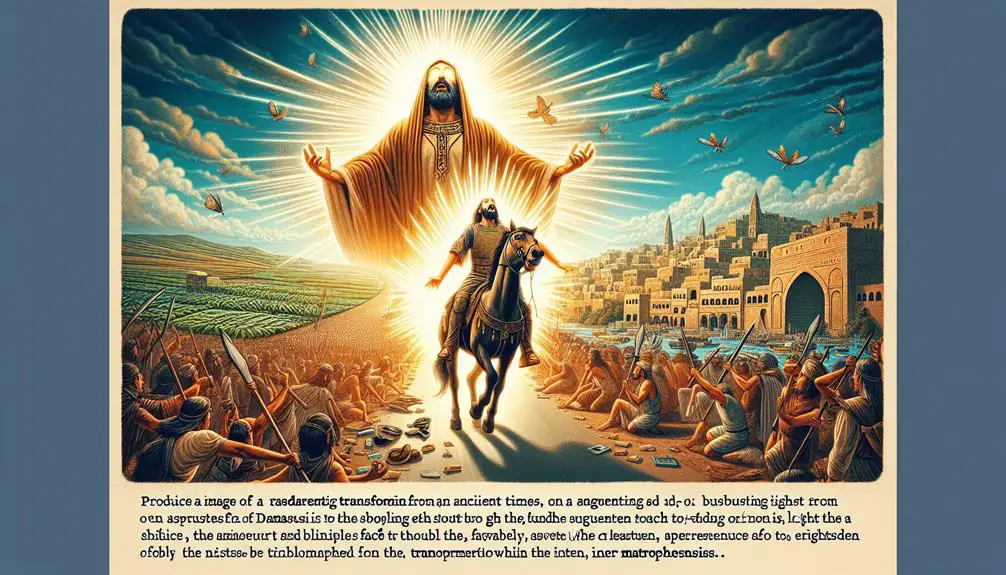
Examples of Changed Lives in the Bible
You might think ancient stories have little relevance to today's fast-paced world, but the lives chronicled in the Bible tell a different story.
Take, for instance, Saul's transformation into Paul—a journey from persecutor to apostle that speaks volumes about personal change and redemption.
Or consider Mary Magdalene, whose life took a dramatic turn, showing that everyone has the potential for a fresh start.
These narratives aren't just historical accounts; they're powerful examples of transformation that can inspire and challenge us.
As we explore these stories together, you'll discover timeless lessons on resilience, forgiveness, and the possibility of a second chance.
Key Takeaways
- Divine encounters can lead to profound personal transformations, exemplified by Saul's conversion to Paul.
- Leadership and faith are intertwined, as seen in Moses' journey from exile to leading Israel's exodus.
- Stories of redemption, like Zacchaeus and the Prodigal Son, highlight the power of forgiveness and moral restoration.
- Human resistance to divine will can evolve into obedience and spiritual growth, illustrated by Jonah's and Peter's journeys.
Saul to Paul: A Radical Transformation
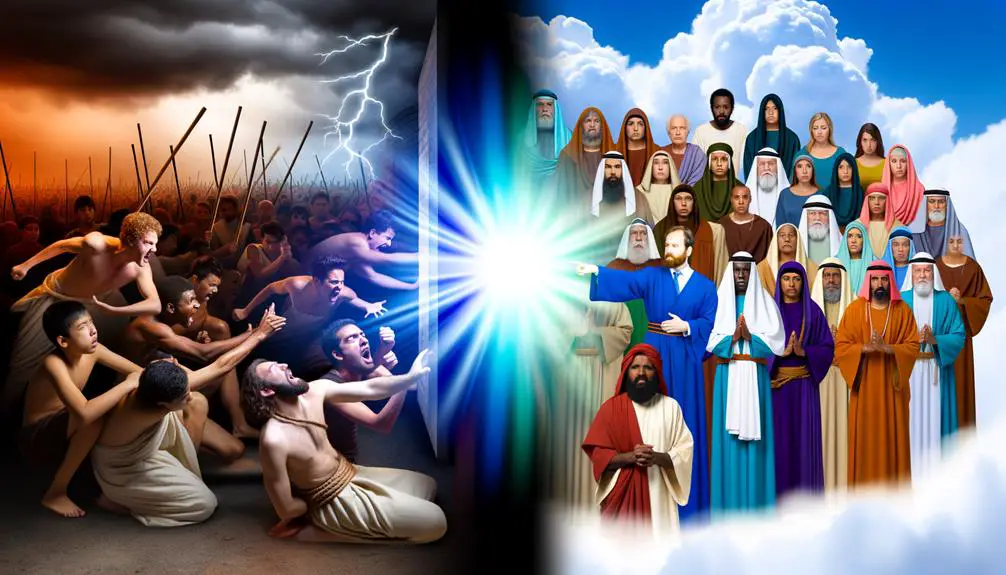
Saul's transformation into Paul stands as a profound testament to the dynamic power of faith and redemption in the Bible. Originally a fervent persecutor of Christians, Saul's encounter on the Damascus road marks a pivotal moment not only in his life but also in the history of Christianity. This event, where he was struck blind by a divine light and heard the voice of Jesus asking, 'Saul, Saul, why do you persecute me?' (Acts 9:4), catalyzed a dramatic change in his beliefs and actions.
Analyzing this transformation offers insights into the themes of forgiveness and renewal that permeate biblical narratives. Saul's journey from persecutor to preacher underscores the idea that no one is beyond the reach of divine grace. Following his experience on the Damascus road, he devoted his life to spreading the gospel of Jesus Christ, undergoing significant hardships, including imprisonment and beatings, to fulfill his mission.
His writings, which form a substantial part of the New Testament, reflect a deep theological understanding and a passionate commitment to his newfound faith. Paul's letters to early Christian communities not only provided guidance and encouragement but also laid the foundational theology of Christianity.
Through the lens of scholarly analysis, Paul's transformation illustrates the transformative power of faith and the potential for personal redemption. It challenges readers to consider the impact of divine intervention and personal faith in leading to profound personal change, moving from a position of opposition to one of fervent advocacy.
Mary Magdalene's New Beginning

You observe in Mary Magdalene's narrative a pivotal encounter with Jesus, marking the beginning of her profound transformation and unwavering devotion.
This interaction not only alters her personal trajectory but also underscores the transformative power of divine encounters in biblical stories.
Her subsequent actions, rooted in deep-seated faith, exemplify a life radically changed, thereby contributing to the broader discourse on redemption and renewal within the New Testament.
Encounter With Jesus
Mary Magdalene's encounter with Jesus marked a transformative moment, fundamentally altering her life and role within the early Christian community. This pivotal meeting is characterized by divine healing and spiritual awakening, elements central to understanding her profound transformation.
Through Jesus' intervention, Mary Magdalene experienced a liberation from the afflictions that had bound her, signifying a broader thematic element of redemption and renewal prevalent in biblical narratives. This divine healing underscores the transformative power of faith and the possibility of renewal through spiritual awakening.
Analyzing her encounter with Jesus reveals the depths of personal change that can occur through spiritual encounters, highlighting a key aspect of Christian theology: the capacity for personal and spiritual growth through divine interaction.
Transformation and Devotion
Following her transformative encounter with Jesus, Mary Magdalene embarked on a new path marked by deep devotion and unwavering commitment to her spiritual awakening. This journey, catalyzed by divine intervention, exemplifies a profound spiritual awakening, characterized by:
- Unwavering Faith: Mary's faith became unshakeable, demonstrating the power of belief in the face of adversity.
- Dedication to Service: Her life transformed into one of service, highlighting the importance of selflessness in spiritual growth.
- Witness to the Resurrection: Mary's role as the first witness to Jesus' resurrection underscores the significance of divine revelation in personal transformation.
- Legacy of Devotion: Her story continues to inspire countless individuals towards a path of devotion and spiritual awakening, illustrating the enduring impact of transformative spiritual experiences.
Moses: From Exile to Leader
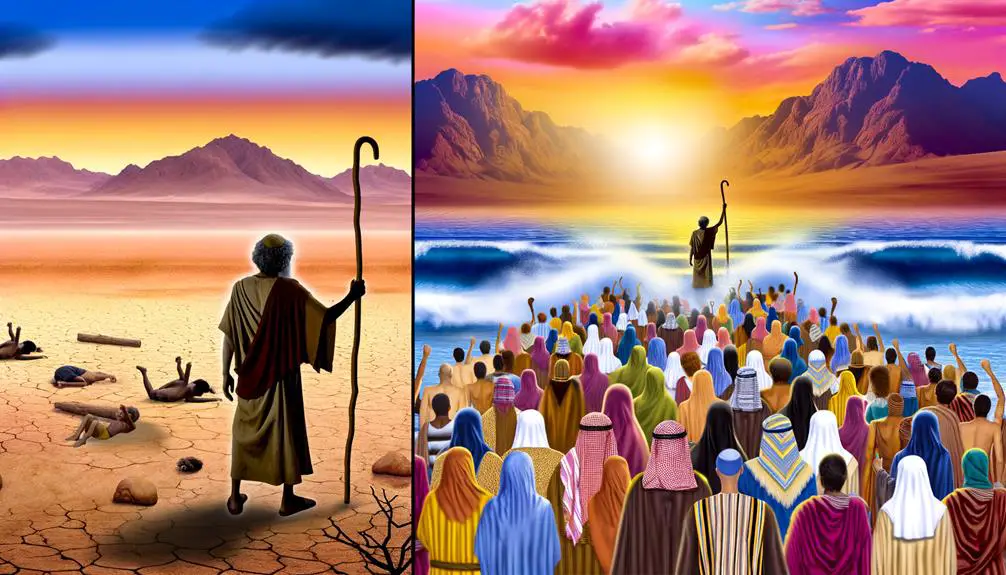
You'll find Moses' transition from exile to a pivotal leader fascinating, especially considering his humble beginnings.
His life's journey, leading to Israel's exodus, showcases a profound transformation influenced by divine intervention and personal resolve.
This analysis aims to explore the complexities of his development and the impact on his leadership.
Moses' Humble Beginnings
Moses' journey from a humble shepherd in exile to a pivotal leader showcases a remarkable transformation underpinned by resilience and divine intervention. This transformation began in a prince's palace, but it wasn't until the burning bush event that Moses' true calling was revealed.
Here are four critical elements of his humble beginnings:
- Early Life in Exile: Moses flees Egypt, abandoning his life of privilege.
- Shepherd in Midian: He embraces a modest life, tending sheep in the desert.
- The Burning Bush: A divine encounter on Mount Horeb that changes his destiny.
- Reluctance to Leadership: Despite initial hesitations, Moses accepts his role under divine guidance.
This phase of Moses' life illustrates the profound impact of humility and faith in shaping leaders.
Leading Israel's Exodus
Stepping into the role of a leader, Moses orchestrated the historic exodus of the Israelites from Egyptian bondage, signifying a pivotal chapter in their collective narrative. This period marked a significant transformation in Moses' life, from exile to becoming the deliverer of his people. Despite Pharaoh's defiance, Moses persisted, showcasing his leadership and faith.
Phase |
Challenge |
Outcome |
|---|---|---|
Initial Appeal |
Pharaoh's Defiance |
Hardened Heart |
Plagues |
Ecological and Social Disruption |
Pharaoh's Temporary Compliance |
Passover |
Final Plague Threat |
Israelites' Protection |
Exodus |
Egyptian Pursuit |
Miraculous Red Sea Parting |
This table encapsulates the journey's milestones, emphasizing the plague impacts and Pharaoh's eventual relenting — a testament to perseverance and divine intervention.
The Metamorphosis of Zacchaeus
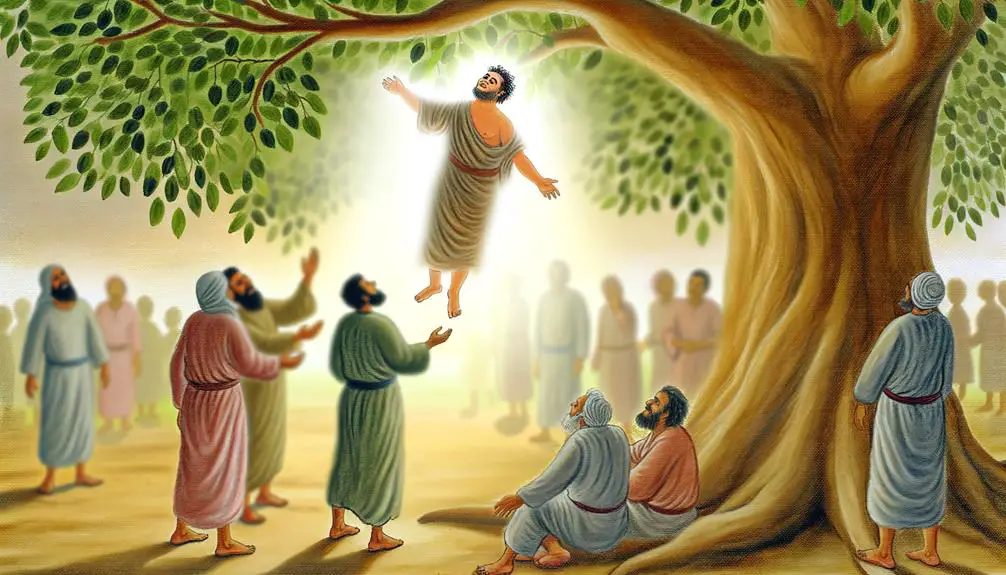
Zacchaeus' transformation from a wealthy tax collector to a generous benefactor illustrates a profound metamorphosis rooted in spiritual awakening. As a tax collector, he was likely seen as a pariah in his community, collecting taxes for the Roman Empire and often accused of extortion. His encounter with Jesus, however, catalyzes a radical change, underscoring the potential for personal restitution and transformation even in those seemingly least likely to change.
To understand Zacchaeus' transformation, consider these four key aspects:
- Initial Status: Zacchaeus was a tax collector, a position associated with greed and corruption. His role likely involved overcharging taxes and pocketing the surplus, leading to personal wealth at the expense of his community's well-being.
- Encounter with Jesus: Zacchaeus' curiosity and desire to see Jesus led him to climb a sycamore tree. Jesus' acknowledgment and decision to stay at his house was significant, showing a willingness to engage with those ostracized by society.
- Act of Personal Restitution: Following his interaction with Jesus, Zacchaeus vows to make restitution by giving half of his possessions to the poor and repaying fourfold anyone he's cheated. This pledge indicates a profound internal change, prioritizing ethical integrity and community welfare over personal wealth.
- Community Impact: Zacchaeus' transformation had a ripple effect, challenging societal norms around redemption and illustrating the transformative power of grace and forgiveness. His story encourages a reevaluation of the capacity for change within individuals and communities.
Zacchaeus' journey from exploitation to restitution exemplifies the transformative potential inherent in spiritual awakening, emphasizing the themes of personal accountability and societal rehabilitation.
Jonah's Reluctant Obedience
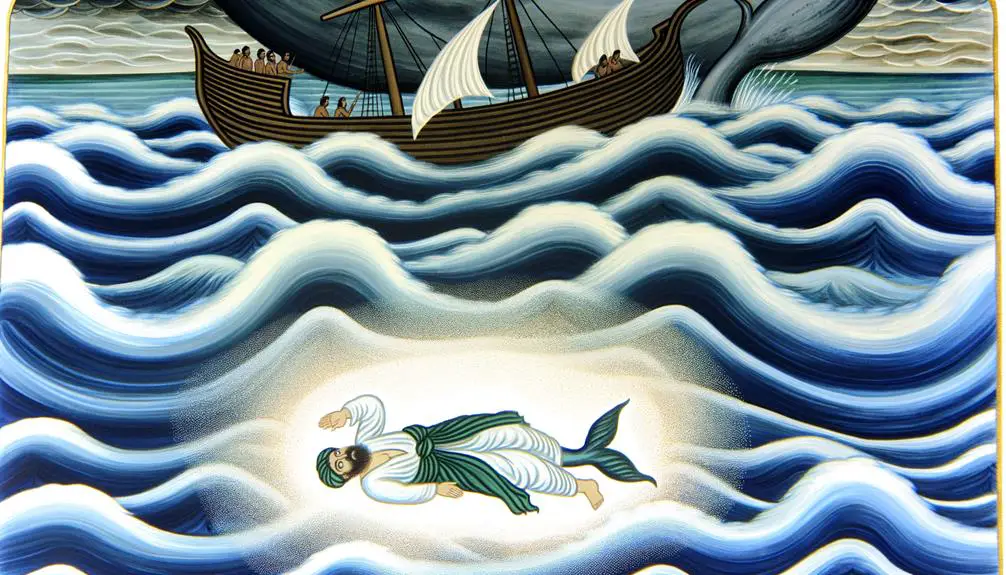
Jonah's tale of reluctant obedience showcases the complex interplay between divine command and human free will, underscoring the challenges inherent in yielding to a higher calling. This narrative isn't merely about a prophet running from God but delves deeper into the essence of human resistance to divine mandates. Jonah's initial refusal to go to Nineveh and his subsequent encounter with a great fish serve as poignant symbols of this struggle.
The naval reflection in Jonah's story is profound. His journey on the sea, culminating in his being swallowed by a fish, represents a pivotal moment of introspection and transformation. This period of isolation in the belly of the fish isn't just a punishment but a critical phase for Jonah to reflect on his disobedience and the consequences of his actions. It's a metaphorical representation of being in the depths of despair and finding redemption through submission to God's will.
Fish symbolism in Jonah's narrative extends beyond a mere vehicle of divine intervention. It signifies rebirth and the possibility of change. Just as the fish vomits Jonah onto dry land, symbolizing his second chance, it reminds you that transformation often comes from the depths of one's struggles. Jonah's eventual compliance to preach in Nineveh, though initially reluctant, signifies a profound change of heart and reaffirms the power of divine persuasion over human obstinacy.
Jonah's story is a testament to the enduring human capacity for change, underscored by divine grace. It teaches that even in the face of reluctance, obedience to a higher calling can lead to significant transformation and redemption.
Peter's Journey of Faith

Much like Jonah's story illustrates the profound capacity for human transformation through divine intervention, Peter's journey of faith in the Bible offers another compelling narrative of personal growth and spiritual enlightenment.
Peter's path is marked by significant events that underscore his development from a simple fisherman to a foundational figure in the early Christian church. These key moments include:
- Fishing miracles: Peter's initial encounter with Jesus is emblematic of divine intervention transforming ordinary life. The miracle of the great catch not only signifies Peter's calling but also foreshadows the profound impact of faith in realizing what seems impossible.
- Walking on water: This episode reflects Peter's courage and the faltering nature of human faith. Stepping out onto the water, Peter moves towards Jesus but begins to sink as doubt takes hold. This moment underscores the fluctuating strength of belief and the necessity of divine support.
- Confession of faith: Peter's declaration that Jesus is the Christ highlights a pivotal point in his spiritual journey. This confession demonstrates a deepening understanding and commitment to his faith, setting the stage for his future leadership role within the Christian community.
- Denial and redemption: Perhaps the most poignant aspect of Peter's story is his denial of Jesus, followed by a heartfelt process of redemption. This sequence not only illustrates the human propensity for failure but also the boundless capacity for forgiveness and restoration in the faith journey.
Peter's journey from fishing miracles to denial redemption encapsulates the transformative power of faith and the enduring promise of personal growth and spiritual enlightenment.
The Prodigal Son's Return
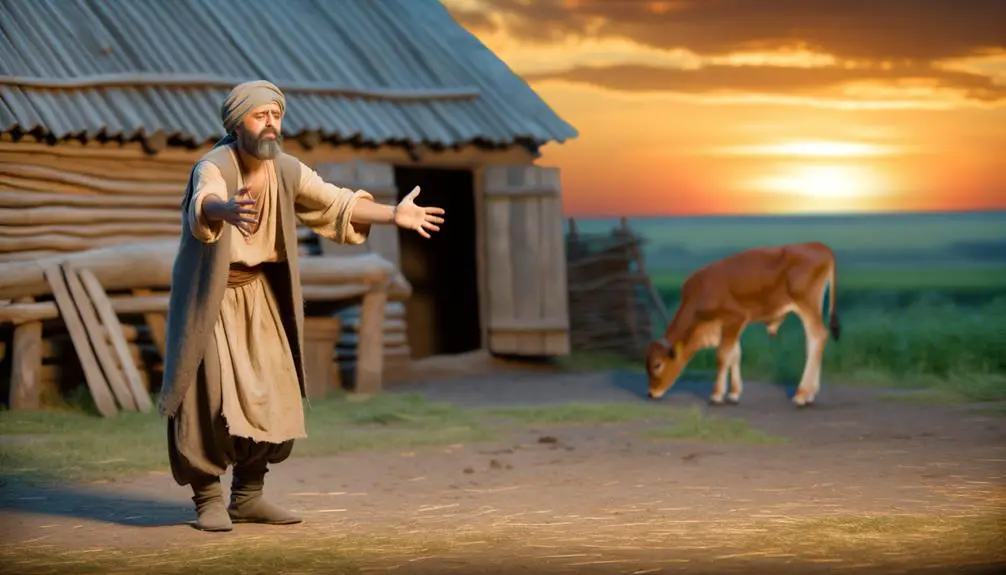
In the parable of the Prodigal Son, we observe a profound exploration of forgiveness, redemption, and the unconditional love of a father towards his wayward child, illustrating the transformative potential of grace and reconciliation in human relationships. This narrative, rich in moral and theological insights, centers on two primary themes: family forgiveness and wealth squandering. It unfolds as a younger son demands his inheritance prematurely, only to dissipate his fortune in a distant land, leading to destitution.
The crux of the parable lies in the son's realization of his folly and his decision to return home, humbly willing to accept even the lowest position in his father's household. Contrary to expectations, his return is met not with condemnation but with an outpouring of unconditional love and acceptance, symbolized by the father's embrace and the celebratory feast that follows. This response underscores the father's abiding love and the joy found in the reconciliation of estranged relationships.
Analytically, the parable serves as a metaphor for the redemptive love of God for humanity, regardless of past transgressions. The concept of wealth squandering extends beyond mere financial loss to encompass the wasting of one's life on pursuits that ultimately lead to spiritual bankruptcy. The narrative emphasizes that true wealth lies in the relationships nurtured with family and, by extension, with the divine.
Frequently Asked Questions
How Did the Cultural and Societal Norms of the Time Influence the Personal Transformations of Individuals Like Saul/Paul and Mary Magdalene?
You're exploring how cultural and societal norms influenced personal transformations. Cultural integration and societal backlash played pivotal roles.
For individuals undergoing significant changes, these elements either supported or challenged their development. You're analyzing how external pressures shaped their journeys, considering the broader context of their times.
This approach helps you understand the complex interplay between personal evolution and the societal framework, shedding light on the profound impact of cultural and societal dynamics on personal growth.
Are There Any Psychological Theories or Models That Can Explain the Dramatic Changes Observed in Characters Such as Moses and Zacchaeus?
Absolutely, the psychological metamorphosis of characters like Moses and Zacchaeus can be unpacked using theories like Identity Crisis and Transformational Leadership. Imagine a caterpillar turning into a butterfly; that's akin to their profound changes.
Identity Crisis delves into their internal struggles, leading to a redefined self. Meanwhile, Transformational Leadership explains how their influence reshaped others' lives.
Analyzing their stories through these lenses offers a rich, scholarly insight into their transformations.
How Do Scholars Reconcile the Miraculous Elements of These Stories With Historical and Archaeological Evidence?
You're diving into how scholars handle the blend of miraculous validation and archaeological skepticism in ancient narratives. They often approach these stories with a critical eye, separating historical facts from symbolic or theological elements.
What Are the Theological Implications of the Concept of Free Will in the Context of the Transformative Experiences of Jonah and the Prodigal Son?
When considering the theological implications of free will, you're delving into a complex interplay between divine sovereignty and human responsibility. Jonah's reluctance and the prodigal son's rebellion highlight this dynamic. Both stories underline that while God has ultimate control, individuals possess the freedom to choose their paths.
This juxtaposition invites a deeper reflection on how divine guidance and personal decisions coexist, emphasizing a theology that respects both divine intention and human agency.
How Have Modern Interpretations and Adaptations of These Biblical Stories (In Literature, Film, and Other Media) Influenced Contemporary Understanding of Their Moral and Spiritual Lessons?
Modern interpretations of biblical stories, through cinematic interpretation and literary adaptation, serve as a mirror reflecting today's moral and spiritual dilemmas. By reimagining tales like Jonah's defiance and the Prodigal Son's redemption, you see these ancient narratives anew, understanding their lessons in the context of contemporary life.
These adaptations not only preserve the essence of the stories but also invite you to explore deeper meanings, shaping your perception of their timeless messages.
Conclusion
The transformational narratives within the Bible, exemplified by figures such as Saul-turned-Paul and Mary Magdalene, underscore a profound theme of redemption and change.
Interestingly, a Pew Research Center study found that 63% of people in a global survey indicated religion as a significant source of personal transformation. This statistic highlights the enduring relevance of these ancient narratives, illustrating how spiritual journeys continue to resonate and inspire individuals seeking change in their lives today.
The Bible's stories, thus, serve not only as religious texts but as universal tales of human metamorphosis.

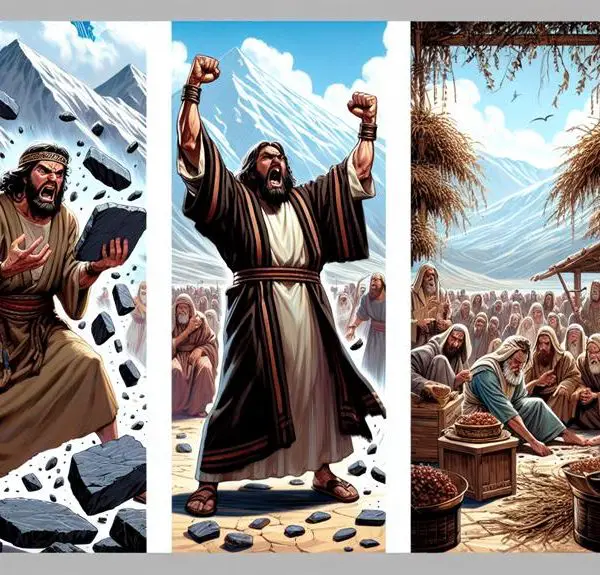
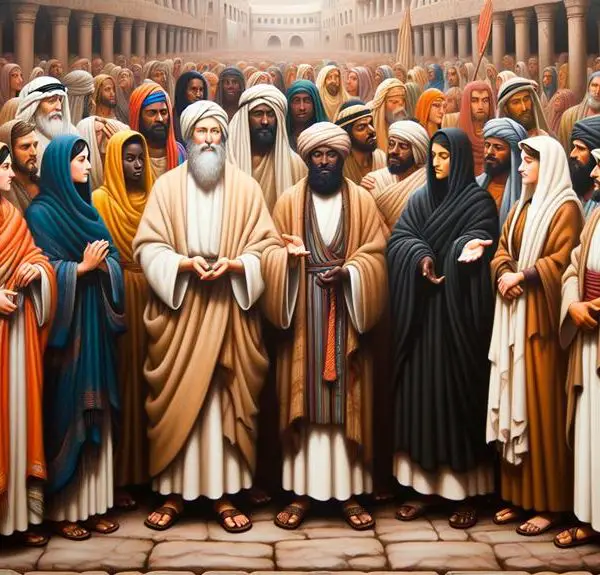
Sign up